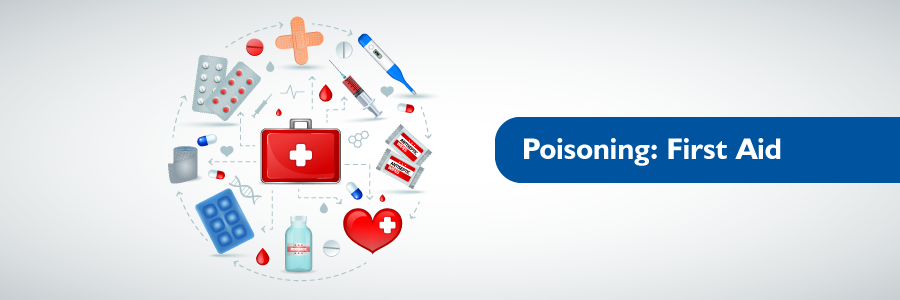Categories
- Cardiology 84
- Dermatology 45
- Endocrinology 33
- ENT 16
- Fertility 190
- Gastroenterology 78
- General-Medicine 81
- Gynecology 80
- Hematology 19
- Infectious-Diseases 33
- Neurology 52
- Oncology 34
- Ophthalmology 23
- Orthopedics 69
- Pediatrics 31
- Procedure 23
- Public-Health 144
- Pulmonology 59
- Radiology 8
- Urology 68
- Wellness 161
- Woman-and-child 77

Poisoning: First Aid
Poisoning or intoxication is an injury or death of a person caused by the ingestion, inhalation, touch or injection of many drugs, chemicals, venom or gases. Many chemicals, such as medicines and carbon monoxide, are toxic at higher concentrations or dosages. Certain cleaners are only dangerous if consumed, while others generate toxic gases/fumes. Children are especially vulnerable to even trace doses of some medications and substances.
Depending on the following, one should treat a possible poison victim:
- The symptoms
- The age of the individual
- Whether you are aware of the type and quantity of the chemical that caused the poisoning.
Secure your health with a second opinion. Make informed decisions and book your appointment today!
Get A Second OpinionWhen to suspect poisoning?
Signs and symptoms of poisoning can resemble those of other diseases, including seizures, alcohol intoxication, stroke, and an insulin reaction.
Symptoms and indicators of poisoning may include:
- Drowsiness
- Breath that smells like chemical.
- Vomiting
- Redness or burns around the lips and mouth
- Difficulty breathing
- Confusion or another altered mental status
Be on the lookout for signs of poisoning, such as empty prescription bottles or packages, pills that have been sprayed, burns, stains, and scents on the suspect or nearby objects. Consider the potential that a child may have ingested a button battery, used medical patches, or taken prescription medication.
When to call for help?
Call the local emergency number right away if the individual is:
- Having seizures
- Unable to breathe or has stopped breathing
- Drowsy or unconscious
- Uncontrollably restless or agitated
- Known to have intentionally or unintentionally overdosed on any pharmaceutical or other substance (in these situations, the poisoning typically involves larger amounts, often along with alcohol).
Be able to provide details about the victim's symptoms, age, weight, other medications used, and any knowledge you may have on the toxin. Try to ascertain how much was consumed and when the person was exposed to it. When talking with the poison control center, it is best to have the pill bottle, pharmaceutical box, or another suspect container available so that you may refer to its label.
What to do while waiting for help?
Take the following steps until help arrives:
- Cool or lukewarm water should be used to flush the eye for 20 minutes gently or until assistance arrives.
- Remove any contaminated clothing while wearing gloves. Rinse the skin for 15 to 20 minutes in the shower or with a hose.
- Take out anything still in the person's mouth. Check the label on the bottle if the suspected poison is a home cleaning or other chemical, and then follow the guidelines for accidental poisoning.
- Get the individual outside as soon as possible.
- If they vomit, move their head to the side to avoid choking.
- Start performing CPR if the victim is not breathing, moving, or coughing.
- To send with the ambulance team, collect pill bottles, packets, or containers with labels that include information about the toxin.
- Call your regional poison control for additional instructions.
Ready to take control of your health journey? Book your appointment now and start your path towards wellness today!
Book an AppointmentPreventing poisoning
To lessen the possibility of accidental medicine poisoning:
- If you are confused about the instructions or have concerns, consult the pharmacist or GP for guidance.
- Determine whether the medication is one of those that should not be taken with alcohol or certain foods.
- Some medications can have unpredictable effects when used with other medications, including herbs. must make sure before combining several medications
- Never take a medication that was intended for someone else.
- Keep any medications away from children.
- You should speak with the doctor or pharmacist if you are confused about the recommendations or have any other questions.
Always remain composed and calm, and make an effort to inform the person and their family of the progression of events as they happen.

Categories
- Cardiology 84
- Dermatology 45
- Endocrinology 33
- ENT 16
- Fertility 190
- Gastroenterology 78
- General-Medicine 81
- General 6
- Gynecology 80
- Hematology 19
- Infectious-Diseases 33
- Neurology 52
- Oncology 34
- Ophthalmology 23
- Orthopedics 69
- Pediatrics 31
- Procedure 23
- Public-Health 144
- Pulmonology 59
- Radiology 8
- Urology 68
- Wellness 161
- Woman-and-child 77